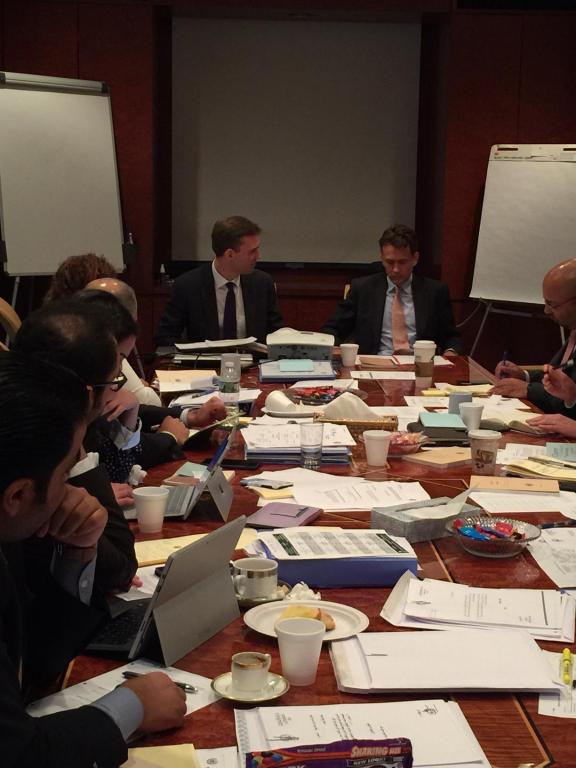UNITAR Continues Training Course for Kuwaiti Diplomats
 23 August, 2017, New York, USA – The United Nations Institute for Training and Research (UNITAR) resumed its Training Course “Strengthening Knowledge and Skills in Multilateral Diplomacy: Practical Preparation for Membership in the United Nations Security Council” for Kuwaiti diplomats with another three modules. The resumed Courses took place at the Permanent Mission of Kuwait to the United Nations on 23 August 2017. Following the first two modules on the Security Council Decision-Making and Sanctions, the third module focused on media relations. The speakers of the module, Ms. Edith Lederer, United Nations Bureau Chief for the Associated Press, and Mr. Sherwin Bryce-Pease, President of the United Nations Correspondents Association, collectively led an interactive discussion on the nuances to navigating the domains of public diplomacy and media relations for non-permanent Security Council members. Ms. Lederer and Mr. Bryce-Pease stressed on the importance of communications and how “microphone is your friend.” Sweden was cited as an example for its regular interaction with the media through monthly background briefings as well as instant social media updates throughout their term. The Kuwaiti diplomats were encouraged to prepare and engage with the press in a similar manner, to establish
23 August, 2017, New York, USA – The United Nations Institute for Training and Research (UNITAR) resumed its Training Course “Strengthening Knowledge and Skills in Multilateral Diplomacy: Practical Preparation for Membership in the United Nations Security Council” for Kuwaiti diplomats with another three modules. The resumed Courses took place at the Permanent Mission of Kuwait to the United Nations on 23 August 2017. Following the first two modules on the Security Council Decision-Making and Sanctions, the third module focused on media relations. The speakers of the module, Ms. Edith Lederer, United Nations Bureau Chief for the Associated Press, and Mr. Sherwin Bryce-Pease, President of the United Nations Correspondents Association, collectively led an interactive discussion on the nuances to navigating the domains of public diplomacy and media relations for non-permanent Security Council members. Ms. Lederer and Mr. Bryce-Pease stressed on the importance of communications and how “microphone is your friend.” Sweden was cited as an example for its regular interaction with the media through monthly background briefings as well as instant social media updates throughout their term. The Kuwaiti diplomats were encouraged to prepare and engage with the press in a similar manner, to establish  ground rules while leveraging all opportunities to voice their stance and viewpoints.
ground rules while leveraging all opportunities to voice their stance and viewpoints.
The fourth module focused on the Security Council and General Assembly procedures. Professor Larry Johnson of Columbia Law School and former United Nations Assistant-Secretary-General, Legal Affairs Division, laid out a brief comparison between standard procedures and vetoes, followed by his discussion on the procedural aspects of two case studies – Yugoslavia and Palestine. Professor Johnson then moved on to discuss administrative and budgetary questions within the General Assembly’s Rules of Procedures, which unveiled the boundaries of Security Council decisions and the different division of works between the Security Council and the General Assembly.
The fifth module equipped the Kuwaiti diplomats with specific know-how in preparing, drafting and negotiating Security Council Resolutions. Mr. David Clay, Deputy Political Counsellor of the United Kingdom Mission to the United Nations, and Mr. Walter Miller, Political Counsellor and Deputy Political Coordinator of the U.S. Permanent Mission to the United Nations, engaged in an interactive discussion with the participants in regards to general practices of the Security Council and the tips to an effective fulfilment of the role as a “pen-holder.” Multiple questions were raised by the Kuwaiti diplomats, including references to the current Syrian situations. Mr. Clay and Mr. Miller expressed their viewpoints as well as their support for the Security Council’s adoption of the Resolution to humanitarian assistance in Syria.
Photos: Participants and presentors of the training

